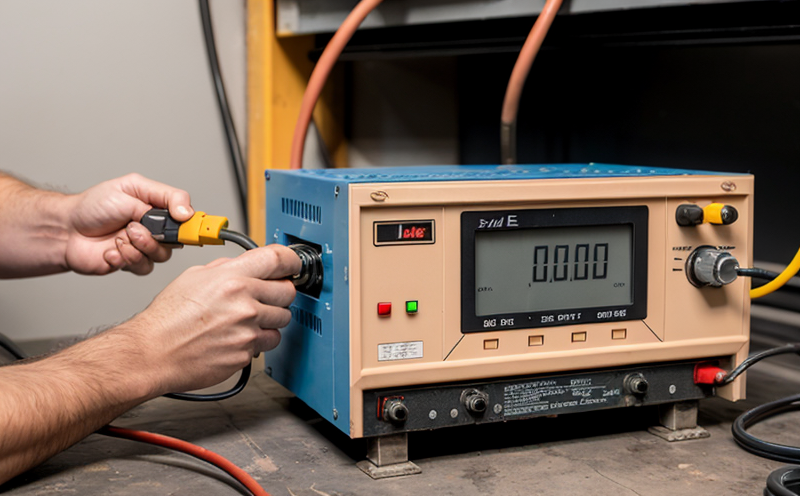JEDDEC JESD22-A122 Die Energy Absorption Capacity Testing
The JEDEC standard JESD22-A122 is a cornerstone in the evaluation of die-level electrical and functional performance, particularly focusing on energy absorption capacity. This testing protocol is pivotal for ensuring that semiconductor devices can withstand harsh environmental conditions without degradation or failure. The test simulates real-world stress scenarios encountered during manufacturing, handling, and deployment.
The JESD22-A122 procedure involves subjecting a die to an electrical pulse characterized by specific parameters such as voltage, current, and energy content. These pulses are designed to mimic the transient conditions that can occur in various applications, including automotive electronics, aerospace systems, and consumer devices. The test aims to determine how well a semiconductor device can absorb this energy without sustaining damage or compromising its integrity.
The testing process typically involves placing the die into an appropriate fixture connected to a high-voltage pulse generator. A precise waveform is generated that meets the specified parameters in the standard. The die is subjected to multiple pulses, and subsequent inspections are conducted to evaluate any changes in electrical performance, physical dimensions, or internal structure.
Compliance with this standard ensures that devices meet stringent reliability requirements, which is crucial for industries reliant on high-performance electronics. By adhering to JESD22-A122, manufacturers can enhance their product's durability and ensure compliance with broader industry standards such as ISO 9001 and AS9100.
The test results are critical inputs in the design and manufacturing processes of semiconductor devices. Engineers use these insights to refine device architecture and materials selection. For instance, understanding how a die behaves under high-energy pulses helps in optimizing insulation layers or selecting more robust substrates.
Moreover, compliance with JESD22-A122 is not just about meeting regulatory requirements but also about establishing trust within the supply chain. When suppliers demonstrate adherence to this standard, it signals reliability and quality assurance across the entire manufacturing process. This is particularly important in sectors like automotive where product integrity can have significant implications for safety.
In summary, JESD22-A122 testing plays a vital role in ensuring that semiconductor devices are robust enough to withstand the rigors of real-world environments. By implementing this standard, manufacturers can enhance their products' reliability and meet stringent quality standards, thereby gaining a competitive edge in the market.
Why It Matters
The importance of JESD22-A122 testing cannot be overstated in the semiconductor industry. The ability to withstand high-energy pulses is crucial for ensuring long-term reliability and safety of devices. This test helps identify potential weaknesses early in the design process, allowing manufacturers to address these issues before they become costly problems.
For quality managers, JESD22-A122 provides a clear path to ensure that products meet critical specifications. By following this standard, they can demonstrate compliance with broader industry standards and enhance customer trust. This is especially important in sectors like automotive and aerospace where product integrity is paramount for safety.
From the perspective of R&D engineers, JESD22-A122 offers valuable insights into how materials and designs perform under stress conditions. These insights are invaluable for refining prototypes and optimizing production processes. Engineers can use test results to guide material selection and design improvements, ultimately leading to more robust products.
For procurement teams, ensuring compliance with JESD22-A122 is a key factor in selecting reliable suppliers. By partnering with vendors who adhere to this standard, companies can ensure that their supply chain meets the highest quality standards. This reduces the risk of product failures and enhances overall manufacturing efficiency.
The broader implications extend beyond individual products; compliance with JESD22-A122 contributes to the industry's reputation for reliability and safety. By setting a high bar for energy absorption capacity, this standard helps maintain public trust in semiconductor technologies used in critical applications.
Applied Standards
The primary applied standard here is JESD22-A122, which defines the procedure for evaluating die-level energy absorption capacity. This standard aligns with other industry standards such as ISO 9001 and AS9100, ensuring that testing practices are consistent across various sectors.
In addition to these widely recognized standards, JESD22-A122 incorporates elements from international electrical and mechanical standards like IEC 60364 for power distribution systems. These references ensure that the test methodology is robust and applicable across different environments and applications.
The standard specifies detailed procedures for preparing specimens, applying pulses, and conducting inspections post-testing. It includes specific parameters such as pulse voltage, current, energy content, and duration to ensure consistency in testing methods worldwide.
By adhering to JESD22-A122, manufacturers can demonstrate their commitment to quality and reliability, thereby enhancing their competitive position in the market. This standard also supports the broader goal of fostering innovation by providing a reliable framework for evaluating new materials and designs.
Competitive Advantage and Market Impact
The implementation of JESD22-A122 testing offers significant benefits to semiconductor manufacturers, providing them with a competitive edge in the market. By ensuring that products meet stringent reliability requirements, companies can enhance their reputation for quality and safety.
Compliance with this standard is particularly valuable in sectors like automotive and aerospace where product integrity is critical for safety and performance. In these industries, suppliers who adhere to JESD22-A122 demonstrate a commitment to excellence, which can lead to long-term partnerships and increased market share.
The test results also provide valuable data that can be used to improve product designs and manufacturing processes. This continuous improvement cycle ensures that products remain at the forefront of technological advancements. By staying ahead of industry trends, manufacturers can better meet customer expectations and drive innovation within their organizations.
Moreover, JESD22-A122 testing helps companies comply with regulatory requirements, reducing the risk of product recalls or legal issues. This compliance not only protects the company's reputation but also ensures that products are safe for use by end-users.
The broader market impact extends to all stakeholders involved in semiconductor manufacturing and supply chains. By setting a high bar for energy absorption capacity, this standard helps maintain public trust in semiconductor technologies used in critical applications. This trust is essential for fostering innovation and driving the industry forward.





